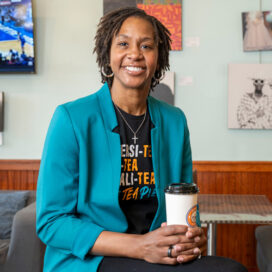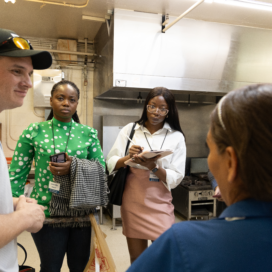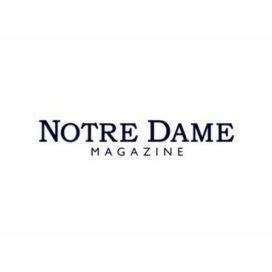Growth experience: 2020, a year in review
Published: December 17, 2020 / Author: Mendoza College of Business
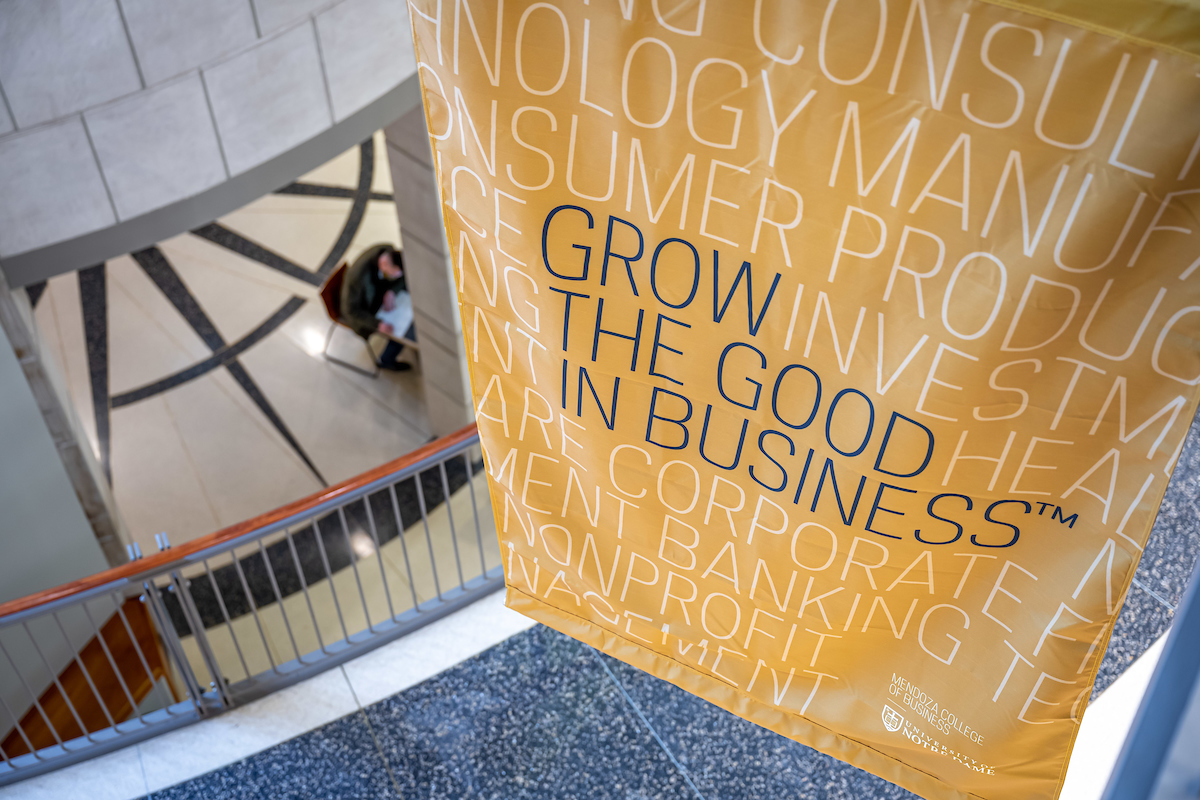 The coronavirus pandemic has triggered massive upheaval in every sector and reshaped the business landscape for the foreseeable future.
The coronavirus pandemic has triggered massive upheaval in every sector and reshaped the business landscape for the foreseeable future.
But one thing hasn’t changed: our community’s commitment to Grow the Good in Business.
Looking back at the stories we’ve shared this year, we see this imperative at work again and again in the lives of Mendoza College of Business alumni, students, faculty and staff. Our 2020 year in review highlights some of these stories.
‘Grow the Good’
The challenges of today’s complex business climate raise the question: What does our world need from b-schools, the training ground for the next generation of leaders? With the debut of Mendoza’s “Grow the Good in Business” imperative in January 2020, the College rearticulated the mission that has been at the heart of Notre Dame’s business school since its founding in 1921. It combines the College’s commitment to make business a force for good in society with its forward-looking focus to advance human flourishing through education, leadership development and research.
Two lecture series kicked off the spring semester by exploring the future of data privacy and security and the issue of gender diversity in leadership. (You can watch several recordings from these events here.) The Notre Dame Institute for Global Development hosted its second Women’s Investing Summit featuring top female executives in the investment world.
And then came the coronavirus pandemic.
Pandemic learning
There was nothing easy about the shift to virtual classes after spring break due to the pandemic. But Mendoza students, faculty and staff quickly stepped up to the challenge.
The Notre Dame Executive MBA-Chicago Class of 2021 was the first at the University to hold online classes and grapple with the challenge of cultivating relationships remotely. The cohort started each class session with time to get to know one another better, scheduled online happy hours and even threw a Zoom bridal shower for a classmate. Within days of the shift to virtual learning, they also coordinated a fundraiser that raised money to provide more than 16,000 meals to children in Chicago.
In between virtual classes and online meetings, Father Arthur Joseph Ssembajja (MBA/MGA ’21) went daily to a small chapel on the second floor of Mendoza to pray for victims of the pandemic.
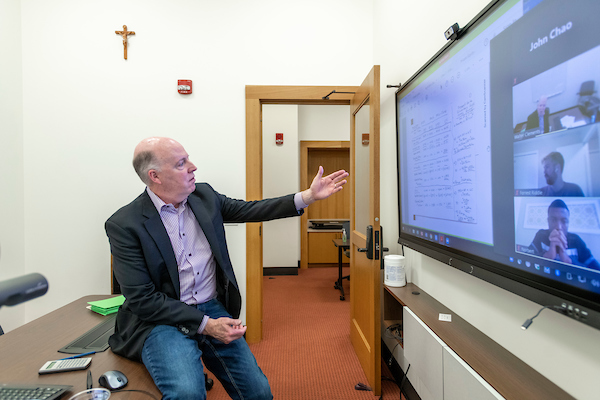
Finance professor Walter Clements, associate dean of Executive Education, taught his MBA-level Working Capital Management course from a small team room in the Stayer Center. The team rooms feature touchscreen monitors that professors can write on, and the content is viewable by remote students via screen sharing.
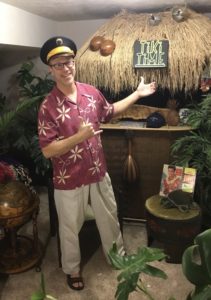
Meanwhile, management associate teaching professor Chad Harms donned a floral patterned button-up shirt, headed to his basement and got to work adapting his undergraduate Foresight in Business and Society curriculum for digital delivery.
Finance assistant teaching professor Jason Reed found himself teaching his Applied Investment Management class via Zoom with his newborn daughter sleeping in his lap. He noted in an essay how those early days reminded him of why he came to Notre Dame. “Students and faculty were continuously looking in on one another. Inspiring words of hope and reminders of our shared experience were all around us.” In the fall, Reed launched a podcast as a way to connect with students outside the classroom.
After adapting her introductory business law course for online instruction, accountancy teaching professor Tonia Murphy began thinking about how to incorporate pandemic-related legal issues into the curriculum. “The pandemic is having such an effect on our students’ lives. It’s top of mind for everybody, so to ignore the obvious connections with our course material would be a mistake,” she said. “Students are raising these issues in class. I’m glad to be prepared to address them.” She incorporated her research into the presentation “Law in the Time of the Coronavirus: How and Why to Cover Coronavirus Disruptions in a Business Law or Legal Environment Course,” which won the master teacher competition held by the Academy of Legal Studies in Business.
As students saw summer internship opportunities withdrawn due to the pandemic, the Notre Dame Institute for Global Investing stepped in and developed a pair of virtual finance internship programs — the Virtual Internship Program (VIP) and the Virtual Investing Bootcamp Experience (VIBE). In light of Notre Dame’s extended winter break due to the pandemic, NDIGI also offered students several winter break remote learning options.
In June, Bloomberg Businessweek published a story on the “Top Business Schools That May Best Prepare Grads for a Covid-19 World.” The piece ranked Mendoza as No. 6 on its list of schools that students and alumni say excel in creativity and innovation and No. 5 in alumni network.
 The pandemic did not diminish the excitement felt by incoming students, as evidenced by the video made by the Notre Dame MBA Class of 2022. “In times of crisis, many pull back and look for safety. Exceptional leaders rise to the occasion to rally people together and innovate,” said Michael Mannor, the associate dean for the Notre Dame MBA program and John F. O’Shaughnessy Associate Professor of Family Enterprise. “At Notre Dame, we look for these exceptional individuals and work to empower them to go out and grow the good in business. I could not be more proud of this incoming class for rising to the occasion and rallying together as a community.”
The pandemic did not diminish the excitement felt by incoming students, as evidenced by the video made by the Notre Dame MBA Class of 2022. “In times of crisis, many pull back and look for safety. Exceptional leaders rise to the occasion to rally people together and innovate,” said Michael Mannor, the associate dean for the Notre Dame MBA program and John F. O’Shaughnessy Associate Professor of Family Enterprise. “At Notre Dame, we look for these exceptional individuals and work to empower them to go out and grow the good in business. I could not be more proud of this incoming class for rising to the occasion and rallying together as a community.”
Student highlights
The prospect of virtual commencement didn’t diminish the accomplishments of Mendoza’s graduating students. Accountancy student Kate Oh (BBA ’20) and management consulting major Bruce Morris (BBA ’20) were recognized on Poets & Quants for Undergrads’ Best & Brightest for 2020 list.
On the graduate programs side, Emily Clark (MBA ’20) made Poets & Quants’ 2020 Best & Brightest MBAs list while Ben Moore (MBA ’20), John Chao (MBA ’20) and Peter Zanca (MBA/MSBA ’20) were profiled in Poets & Quants’ list of 2020 MBAs to Watch, and John Foley (EMBA ’20) and Sydney Storey (EMBA ’20) made Poets & Quants’ Best & Brightest EMBA list.
Faculty experts
Media outlets reporting on the pandemic reached out to Mendoza faculty for insight into the latest headlines including coronavirus relief packages, unemployment, Zoom security and supply chain issues.
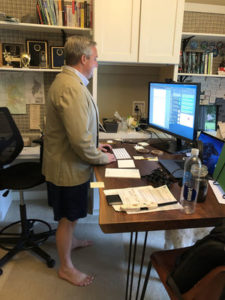
Analytics teaching professor and academic director of Notre Dame’s Chicago-based Master of Business Analytics program Mike Chapple found himself wearing a sports coat and shorts for an interview with the Associated Press after realizing at the last minute it was for broadcast.
Mendoza faculty also turned their research attention and expertise to coronavirus-related issues including developing a statistical framework that can help in understanding the impact of pandemic policy interventions; assessing the difference proactive personality traits made on job performance early on in the pandemic at a hospital in China; using econometrics to model the difference physical distancing can make on viral transmissions; and applying textural analysis to 10-K filings to see if firms included pandemic risk in their assessments; helping large venues, including Notre Dame Stadium, plan out seating arrangements according to physical distancing requirements; and examining how to prioritize ethics during the pandemic.
A number of faculty members also received prestigious awards for research on:
- How historically black colleges and universities (HBCUs) pay higher fees to issue tax-exempt bonds than non-HBCUs.
- How firms can drive brand engagement through social influencers.
- The impact of sharing a bank account on a couple’s spending.
- An algorithm for optimally designing a newspaper subscription plan that maximizes revenues from both readership and advertising.
- Analyzing the digital traces left by individuals and organizations as they utilize computing and mobile devices.
- How the performance of firms that employed a CMO was on average about 15% higher than those that don’t.
The business of education
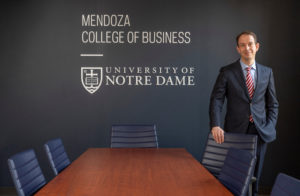 When finance professor Martijn Cremers began his tenure as the Martin J. Gillen Dean of Mendoza College of Business in 2019, he introduced his “Three C’s” of business — three principles necessary for business seeking to be a force for shared good for all stakeholders.
When finance professor Martijn Cremers began his tenure as the Martin J. Gillen Dean of Mendoza College of Business in 2019, he introduced his “Three C’s” of business — three principles necessary for business seeking to be a force for shared good for all stakeholders.
The pandemic has not shifted his integrated vision of business or changed his plans for how Mendoza will prepare students to contribute to human flourishing, cooperate in solidarity and compete with excellence.
A $15 million gift from Ken and Susan Meyer paved the way for the expansion of the The Meyer Business on the Frontlines Program. In addition to offering its signature global experiential learning opportunities, the program is expanding to include domestic projects as well. Viva Bartkus, an associate professor of management who co-founded the Business on the Frontlines course, outlined what the Frontlines experience teaches students and the lessons it offers all of us as we encounter conflict in our own lives.
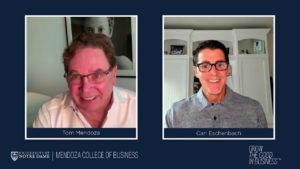 In other news, the College:
In other news, the College:
- Announced the launch of a new residential Master of Science in Finance degree program in 2021.
- Partnered with Notre Dame’s Keough School of Global Affairs to offer a dual master’s degree program in global affairs and business administration.
- Added a second cohort to its residential Master of Science in Business Analytics program.
- Debuted a data analytics concentration to its Master of Science in Accountancy program.
- Launched a popular web speaker series on leadership with Tom Mendoza, former president and vice chairman of NetApp, called “Tom Mendoza Presents.” You can watch conversations with Carl M. Eschenbach of Sequoia Capital and Jayshree Ullal of Arista Networks online.
- Added a research director to the leadership team of the Notre Dame Institute for Global Investing.
- Revamped its alumni relations office to serve both undergraduate and graduate alumni.
- Created an outdoor space for students to gather as temperatures grew colder.
What’s ahead
Three questions help guide what will come next at Mendoza College of Business: “How can we elevate? How can we better cooperate? And how can we better integrate?” On the horizon are initiatives including undergraduate honors and scholars programs aimed at academically ambitious students and additional ways analytics will be integrated throughout the curriculum.
“These are challenging times,” Dean Cremers said in a fall interview with Lou Nanni, Notre Dame’s vice president for University Relations. “I think they remind us of the tremendous responsibilities we have toward each other. So if you are in business and you make business decisions, it’s more important than ever to make sure that decisions you make actually benefit everyone else, especially those who don’t have a seat at the table, especially those who have the greatest needs.”

